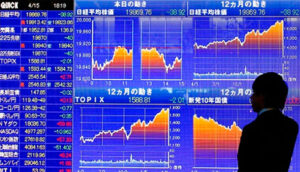
Stock indices of the largest Asia-Pacific countries are declining after the similar dynamics on the US stock market a day earlier.
The important events this week will be the publication of data on changes in consumer prices in the U.S. and China in April. They will be released on Wednesday and Thursday respectively.
China’s Shanghai Composite Index was down 1.4% by 8:36 a.m. and Hong Kong’s Hang Seng was down 0.7%. Both indicators are down for the second consecutive session.
Significant declines in Mainland China were posted by financial sector stocks including China Galaxy Securities (-10%), Bank of China (-5.7%), Agricultural Bank of China (-5.5%), Citic Securities (-3.1%) and ICBC (-4.7%).
On the Hong Kong Stock Exchange, the most significant drop in price was posted by real estate developer Longfor Group Holdings Ltd. – by 3.9% and China Life Insurance Co. (SPB: 2628) by 2.8%.
In addition, computer maker Lenovo went down by 2% as well as Anta Sports Products Ltd. and Li Ning Co. – by 1.9% and 1.8%, respectively.
At the same time, the share price of Internet giant Tencent (SPB: 700) is up 0.5%, retailer Alibaba (SPB: BABA) by 0.9%, carmakers BYD and Geely by 3.7% and 3.6% respectively and chipmakers Sunny Optical Technology Group Co. and Semiconductor Manufacturing International Corp. – by 3.7% and 1.6%, respectively.
The value of Japanese Nikkei 225 index by 8:31 a.m. Moscow timeframe decreased by 0.4 percent.
Among the leaders of falling quotes are shares of metal producers Pacific Metals Co. (-11.2%), Nippon Steel Corp. (-8.2%) and Kobe Steel Ltd. (-3.7%) as well as automobile producer Mitsubishi Motors Corp. (-9.5%).
Moreover, console producer Nintendo (-0.5%) and Sony Group, producing consumer electronics (-0.9%) are also shedding their prices.
South Korea’s Kospi index was down 0.5% by 8:32 MSK.
Shares of the world’s biggest chip and electronics maker Samsung Electronics Co. fell 0.9%, steelmaker Posco – 0.5%.
Meanwhile, stock quotes of Hyundai Motor rose by 2.9%.
Value of Australian S&P/ASX 200 index fell by 0.2%.
Capitalization of the world’s largest mining companies BHP and Rio Tinto declined by 0.2% and 0.8% respectively.
Papers of Australia’s leading wine producer Treasury Wine Estates Ltd. lost 2.1% in price.
Also, following the decline in oil prices, shares of representatives of this industry Woodside Energy and Santos became cheaper – by 0.7% and 1.1% respectively.

Stock indices of the largest countries in the Asia-Pacific region on Friday declined after the negative dynamics of the U.S. stock market.
Consumer prices in Japan rose 3.2 percent year on year in March, according to the country’s Ministry of Internal Affairs and Communications. Thus, inflation slowed down from February’s 3.3% and was the lowest since September 2022.
Consumer prices in Japan, excluding fresh food (a key indicator tracked by the country’s central bank), rose 3.1% in March compared with the same month a year earlier. That matched both the February figure and analysts’ average forecast, Trading Economics reported.
Meanwhile, inflation excluding food and energy increased to 3.8% from 3.5%.
Japan’s Nikkei 225 index was down 0.25% by 8:30 a.m. ET.
Shares of carmakers Nissan Motor Co. (-3.3%) and Mazda Motor (-2.5%) and Internet company Rakuten (-2.6%) were among the leaders of the fall.
In addition, members of the financial industry are getting cheaper, including Mizuho Financial Group Inc. – by 2.3%, SoftBank Group, Dai-ichi Life Holdings Inc. and Mitsubishi UFJ Financial Group Inc. – by 2.1 percent.
Meanwhile, Tokyo Gas Co. (+5.3%), chip maker Advantest Corp. (+3.6%), transportation firm Kawasaki Kisen Kaisha Ltd. (+1.8%) and retailer J. Front Retailing Co. (+1.8%).
China’s Shanghai Composite had fallen 1.4 percent by 8:35 a.m. QE, marking its third straight negative session.
Hong Kong’s Hang Seng index is losing about 1.2%, also due to a decline in the technology sector.
Among them, shares of chipmakers Semiconductor Manufacturing International Corp. and Sunny Optical Technology Group Co. – by 4.1% and 2.9%, respectively, aluminum producer China Hongqiao Group by 4.5%, retailer Alibaba (SPB: BABA) by 3.5%, insurer Ping An Insurance by 3.2% and consumer electronics maker Xiaomi (SPB: 1810) by 2.8%.
South Korea’s Kospi index was down 0.75% by 8:31 a.m. ET.
Shares of steelmaker Posco plummeted 5.9%, automaker Hyundai Motor – 1.3%.
At the same time, the share price of Samsung Electronics Co., one of the world’s largest chip and electronics manufacturers, rose 0.3%.
Australia’s S&P/ASX 200 index was down 0.3 percent by 8:31 a.m. ET.
The capitalization of the world’s largest mining companies BHP and Rio Tinto are down 2.5% and 3.5%, respectively.
Rio Tinto in the first quarter decreased its iron ore shipments by 6% compared to the previous three months and diamond production by 28%. The company cut its 2023 copper output forecast to 590,000-640,000 tons from the previously expected 650,000-710,000 tons.

Stock indices of the largest countries in the Asia-Pacific Region (APR) are down in trading on Friday, following the U.S. stock market.
The pressure on stock markets is being put by renewed fears over further interest rate hikes amid a resilient U.S. economy, which was indicated by fresh statistical data, and hawkish comments from U.S. Federal Reserve (Fed) management.
Federal Reserve Bank of Cleveland (FRB) President Loretta Mester said she thought it was premature to conclude that US inflation was on a steady path toward the US central bank’s 2% target.
Although inflation has slowed somewhat since last summer, it is still too high, Mester said during an event at the University of South Florida on Thursday. Last week’s January Consumer Price Report showed that core inflation is slowing little, she said.
St. Louis Fed Chairman James Ballard said during a speech in Tennessee that he called for a sharper rate hike at the last Fed meeting and did not rule out a sweeping move further down the road.
Japan’s Nikkei 225 Index was down 0.7 percent by 7:13 a.m.
Shares of Internet company Rakuten Group Inc. (-5.5%), Recruit Holdings Co. Ltd., which owns job search sites, (-3.9%) and industrial equipment manufacturer Keyence Corp. (-2.6%).
In addition, investment technology stocks of SoftBank Group (-2.1%), consumer electronics maker Sony (-2.3%) and Asia’s largest clothing retailer Fast Retailing (-0.7%) were getting cheaper.
China’s Shanghai Composite Index was down 0.1% by 7:23 a.m. Hong Kong’s Hang Seng lost 0.7%.
Shares of computer maker Lenovo Group Ltd. were down the most on the Hong Kong Stock Exchange. – by 4 percent, jewelry company Chow Tai Fook Jewellery Group Ltd. – by 3.8 percent and Internet company Baidu Inc. – Ltd. by 2.8 percent.
Shares of Internet giant Alibaba dropped 1.4 percent and consumer electronics maker Xiaomi Corp. – 2.4% and Internet company Meituan – 2.6%.
South Korea’s Kospi was down 0.9% by 7:23 a.m.
One of the world’s biggest chip and electronics maker Samsung Electronics Co. was down 1.7%, automaker Hyundai Motor down 0.5%.
The Australian S&P/ASX 200 index fell 0.86% in trading.
The capitalization of the world’s largest mining companies BHP and Rio Tinto decreased by 0.25% and increased by 0.5% respectively.

Stock indices of the largest Asia-Pacific countries are mainly gaining on Friday following the U.S. stock market dynamics.
The stock exchanges in Mainland China continue to remain closed on the Spring Festival (the beginning of the new year according to the lunar calendar).
The growth of optimism in Asian markets was also supported by the U.S. statistics published the day before, which showed that the economy remains flexible, despite a significant tightening of monetary policy by the Federal Reserve (FRS).
According to preliminary data from the U.S. Commerce Department, the country’s GDP rose 2.9% year-over-year in the fourth quarter after climbing 3.2% in the previous quarter. The consensus forecast by analysts, cited by Trading Economics, suggested economic growth had weakened to 2.6%.
The Nikkei 225 Index was up 0.05% by 7:09 a.m.
The leaders of the price growth are the securities of the chemical company Shin-Etsu Chemical Co. Ltd. (+4.2%), industrial robotics manufacturer Yaskawa Electric Corp. (+3.7%) and Chiba Bank Ltd. (+3.6%).
Shares of carmaker Toyota Motor rose 0.4% and consumer electronics maker Sony gained 1%.
Hong Kong’s Hang Seng index was down 0.01% by 7:16 a.m.
Shares of solar panel maker Xinyi Solar Holdings Ltd. (-3.5%), computer maker Lenovo Group Ltd. (-3%) and home appliances and electronics maker Haier Smart Home Co. Ltd. (-2.3%).
Shares of retailer Alibaba Group Holding Ltd. fell 1.3% while JD.com Inc. rose 1.8%.
South Korea’s Kospi was up 0.7% by 7:14 a.m.
The stock price of one of the world’s largest chip and electronics maker Samsung Electronics Co. is up 1.1%, the share price of automaker Hyundai Motor is down 0.6%.
Australia’s S&P/ASX 200 index added 0.3% for the day.
Australia’s producer price index rose 0.7% quarter-over-quarter in the fourth quarter of 2022, compared with a 1.9% increase in the third quarter. The index was up for the tenth consecutive quarter, but the rate of increase was the slowest since the second quarter of 2021, Trading Economics wrote.
BHP and Rio Tinto, the world’s largest mining companies, rose 0.6% and 0.4%, respectively.
Fortescue Metals Group Ltd. shares gained 0.04%. The company said it shipped a record volume of iron ore in the fourth quarter while cutting production costs compared with the previous three months.

Fresh statistical data on the dynamics of consumer prices in the U.S. in October, which were better than expected, may indicate a turning point in the fight of the U.S. Federal Reserve (Fed) with high inflation and lead to a significant rise in the stock market, experts believe Fundstrat.
Experts predict that the current rally on Wall Street could last 50 days and allow the indicator S & P 500 to soar by 25%, as investors expect that the most aggressive pace of tightening monetary policy by the Fed is over.
This includes analysts pointing to a “significant slowdown” in consumer price growth on a monthly basis, weakening inflation in the durable goods segment and lower health insurance prices.
These signs indicate that inflation could “significantly slow down” in the coming months, said Fundstrat Research Director Tom Lee, quoted by MarketWatch.
According to the expert, if the situation remains favorable, core inflation will increase by 0.3% on a monthly basis within “three to four months.
Consumer prices, excluding food and energy costs (Core CPI), rose by 0.3% on a month-on-month basis in October, which is lower than experts expected. At the same time, the increase in September was 0.6%.
Lee notes that a slowdown in inflation could also help the U.S. stock market grow as the economy avoids a deep recession.
According to him, the likelihood of a pause in the Federal Reserve’s tightening of monetary policy after December has increased on the back of fresh data on inflation.
Market analysts are closely watching for signs that could indicate the Fed will either take a pause in aggressive rate hikes or even begin leaning lower.
The Fed has raised rates by 75 basis points in its last four meetings, now at 3.75-4%. The regulator is closely watching the data on the growth rate of consumer prices, which is one of the important factors in making decisions about monetary policy. The Fed’s inflation target is 2%.
The Fed’s next meeting is December 13-14. Markets are pricing in the current interest rate hike of 50 basis points at the next meeting.